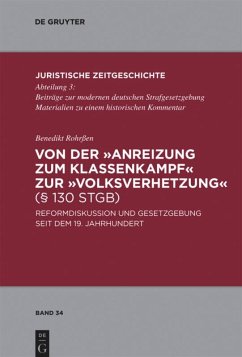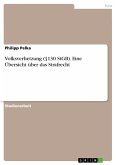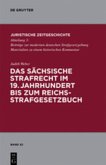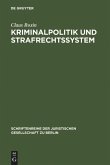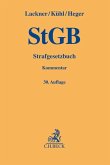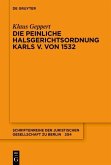â??Incitement to class conflictâ? and â??incitement to hatredâ? - two terms for one statue: § 130 of the German Criminal Code (Strafgesetzbuch: StGB). This work traces their development and the reform discussions. The subject of the examination is a regulation, which considers the forefront of violent actions against members of segments of the population. Its field of application is the intersection of the call for criminal actions, the ban to insult confessions or ideologies as well as abetting in general.
"Anreizung zum Klassenkampf" und "Volksverhetzung" - zwei Bezeichnungen für eine Norm: § 130 StGB.
Die Arbeit zeichnet die Entwicklung dieser Vorschrift nach, deren Vorgänger erst Mitte des 19. Jahrhunderts als Gegenmittel zur Pressefreiheit geschaffen wurden. Seitdem steht die Vorschrift im Spannungsfeld mit der Meinungs- und Pressefreiheit sowie im Kraftfeld politischer Auseinandersetzungen, etwa um das Verbot der Holocaustleugnung.
§ 130 StGB bewahrte vom Kaiserreich bis in die bundesrepublikanische Zeit zunächst seinen Wortlaut. Als Teil des politischen Strafrechts wären allerdings Anpassungen an das jeweilige Staatssystem zu erwarten gewesen. Daher stellt sich die Frage, ob die ursprüngliche Fassung - entgegen der ersten nichtamtlichen Bezeichnung - systemneutral war und ob die geänderte Bezeichnung einen deutlichen Funktionswandel widerspiegelt. Daneben wird die Entwicklung unter weiteren Gesichtspunkten, insbesondere einer möglichen Hinwendung zum symbolischen Strafrecht, analysiert.
"Anreizung zum Klassenkampf" und "Volksverhetzung" - zwei Bezeichnungen für eine Norm: § 130 StGB.
Die Arbeit zeichnet die Entwicklung dieser Vorschrift nach, deren Vorgänger erst Mitte des 19. Jahrhunderts als Gegenmittel zur Pressefreiheit geschaffen wurden. Seitdem steht die Vorschrift im Spannungsfeld mit der Meinungs- und Pressefreiheit sowie im Kraftfeld politischer Auseinandersetzungen, etwa um das Verbot der Holocaustleugnung.
§ 130 StGB bewahrte vom Kaiserreich bis in die bundesrepublikanische Zeit zunächst seinen Wortlaut. Als Teil des politischen Strafrechts wären allerdings Anpassungen an das jeweilige Staatssystem zu erwarten gewesen. Daher stellt sich die Frage, ob die ursprüngliche Fassung - entgegen der ersten nichtamtlichen Bezeichnung - systemneutral war und ob die geänderte Bezeichnung einen deutlichen Funktionswandel widerspiegelt. Daneben wird die Entwicklung unter weiteren Gesichtspunkten, insbesondere einer möglichen Hinwendung zum symbolischen Strafrecht, analysiert.

